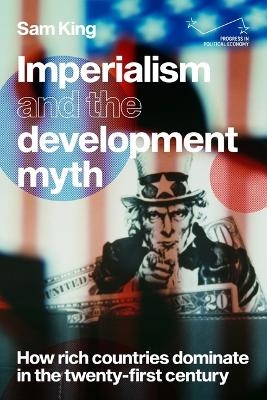
Imperialism and the Development Myth
Manchester University Press (Verlag)
978-1-5261-7191-7 (ISBN)
China has moved from being one of the poorest societies to a level now similar with other relatively developed Third World societies – like Mexico and Brazil. The dominant idea that it somehow threatens to ‘catch up’ economically, or overtake the rich countries paves the way for imperialist military and economic aggression against China. King’s meticulous study punctures the rising-China myth. His empirical and theoretical analysis shows that, as long as the world economy continues to be run for private profit, it can no longer produce new imperialist powers. Rather it will continue to reproduce the monopoly of the same rich countries generation after generation. The giant social divide between rich and poor countries cannot be overcome. -- .
Sam King is a researcher in imperialism and world trade, and editor of red-ant.org -- .
Foreword – Michael Roberts
Introduction
Part I: Two worlds
1 Income polarisation in the neoliberal period
Part II: Contemporary Marxist analysis
2 Decline of Marxist analysis of imperialism
3 Contemporary Marxist response to world polarisation
4 The idea of China as a rising threat
Part III: Lenin’s theory of imperialism and its contemporary application
5 What Lenin’s book does not say
6 Is imperialism the 'highest stage of capitalism'?
7 Lenin’s monopoly capitalist competition
8 Monopoly and the Marx’s labour theory of value
Part IV: Monopoly and non-monopoly capital: the economic core of imperialism
9 Neoliberal polarisation of capital
10 Polarised specialisation of nations
11 Non-monopoly Third World capital
12 Neoliberal globalisation in historical context
13 The industrialisation of everything
14 Growing state dominance
15 Stranglehold: the reproduction of highest labour power
Part V: Super-exploitation of China and why catch-up is not possible
16 China: Third World capitalism par excellence
17 The new Imperialist cold war against China
18 Trade war and China’s latest attempts at upgrading
Conclusion
Bibliography
Index -- .
| Erscheinungsdatum | 07.03.2023 |
|---|---|
| Reihe/Serie | Progress in Political Economy |
| Zusatzinfo | 14 black & white illustrations; 11 tables |
| Verlagsort | Manchester |
| Sprache | englisch |
| Maße | 156 x 234 mm |
| Gewicht | 440 g |
| Themenwelt | Geschichte ► Teilgebiete der Geschichte ► Wirtschaftsgeschichte |
| Wirtschaft ► Volkswirtschaftslehre ► Wirtschaftspolitik | |
| ISBN-10 | 1-5261-7191-0 / 1526171910 |
| ISBN-13 | 978-1-5261-7191-7 / 9781526171917 |
| Zustand | Neuware |
| Haben Sie eine Frage zum Produkt? |
aus dem Bereich


